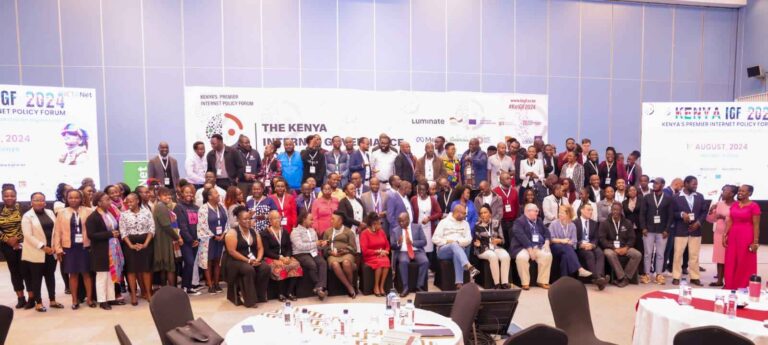The 17th Kenya Internet Governance Forum (KeIGF) convened in August, ignited robust discussions on fostering a collaborative and inclusive digital landscape for the nation.
Dr. Grace Githaiga, Convenor of KICTANet, underscored Kenya’s remarkable digital progress over the past two decades.
Internet penetration has surged from a modest 3% in 2004 to a substantial 40.8% today, while mobile and smartphone adoption has soared.
The ICT sector has emerged as a pivotal economic driver, propelled by innovations in digital payments, e-commerce, and digital services.
However, Dr Githaiga emphasized the urgent need to address challenges, particularly the internet shutdown during the #RejectFinanceBill2024 protests.
She asserted, “The disruption of internet access is unacceptable and must never recur. As ICT stakeholders, our unwavering commitment is to #KeepItOn for all, at all times, without exception.”
This year’s KeIGF theme, “Building Kenya’s Multi-Stakeholder Digital Future,” served as a rallying point for Dr. Githaiga’s address. She stressed the imperative of uniting government, civil society, the private sector, and academia to co-create a digital future that benefits all Kenyans.
“As we discuss the future of internet governance in Kenya and across the globe, it will be of great importance to continue engaging all stakeholders, promote digital inclusion, protect human rights, and ensure effective internet governance to create a digital future that benefits all Kenyans.
Multistakeholder processes should strive to treat all stakeholders fairly and equitably, considering their respective needs, capacities, realities, and vulnerabilities,” said Dr Githaiga.
To cultivate a thriving digital ecosystem, KICTANET has spearheaded initiatives such as the Kenya School of Internet Governance (KeSIG), the Children’s IGF, and gender training programs.
Ali Hussein, Chair of KICTANet’s Board of Trustees, echoed Dr. Githaiga’s call for collaboration in his welcome remarks. He outlined the forum’s key themes: harnessing innovation while mitigating risks, enhancing digital contributions to peace and development, advancing human rights and inclusion, and improving digital governance.
Eng. John Tanui, Principal Secretary for ICT and Digital Economy, delivered the keynote address, outlining the government’s ambitious digital transformation agenda.
The Digital Superhighway Program, aiming to connect 8.5 million homes and enterprises to the internet, and a commitment to digital literacy and skills development were highlighted.
“Our ambitious 100,000 km fibre infrastructure program will facilitate internet access and e-government services as rights for every citizen,” declared Eng. John Tanui.
Tanui also emphasized the importance of robust legal frameworks, citing the Data Protection Act and the Computer Misuse and Cybercrimes Act as milestones. However, he acknowledged the challenges posed by misinformation, disinformation, and cybersecurity threats.
The forum underscored the collective responsibility to bridge the digital divide, safeguard human rights, and harness the potential of emerging technologies like AI while mitigating risks.
Christin Schulz-Kaunga (Head of Programme at GIZ), emphasized the need for a holistic approach, stating, “We need to keep engaging and applying ourselves as a whole society. We need to consider openness, fairness, privacy, and security together.”
As Kenya navigates the complexities of the digital age, the KeIGF serves as a critical platform for shaping the nation’s digital destiny.




